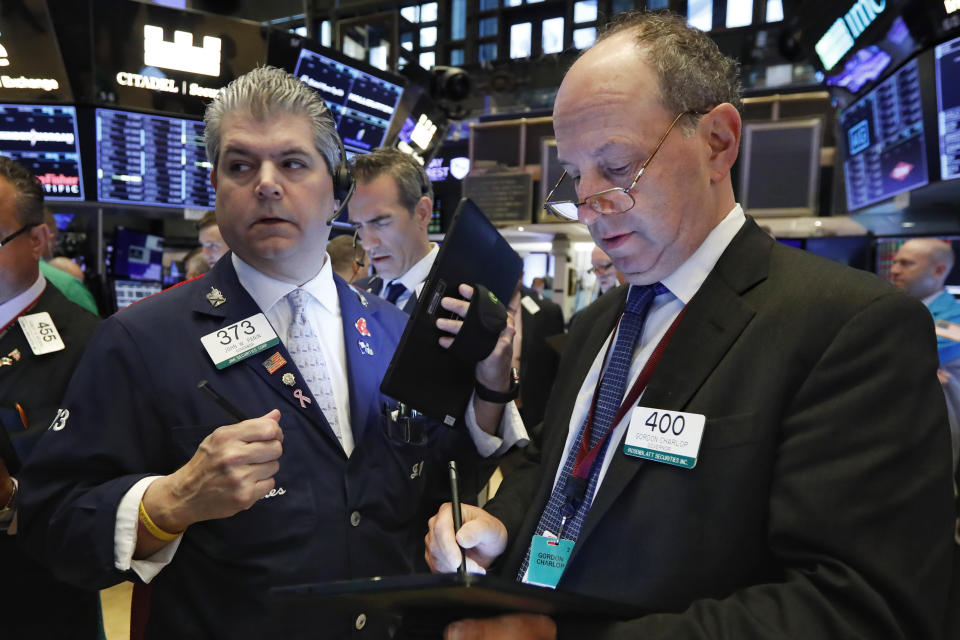Stocks drop as bond yields extend declines
Stocks extended declines Wednesday as slumping bond yields sparked concerns of weaker economic growth, which could be exacerbated by a protracted trade war with China.
The S&P 500 (^GSPC) fell 0.69%, or 19.37 points, as of market close. The Dow (^DJI) fell 0.87%, or 221.36 points, while the Nasdaq (^IXIC) fell 0.79%, or 60.04 points.
U.S. Treasuries extended a rally Wednesday as risk aversion dominated markets, pushing yields sharply lower. The U.S. 10-year yield (^TNX) broke below 2.25% to the lowest level since September 2017. Overseas, the yield on the German 10-year government bond, or bund, fell 1.8 basis points to negative 0.172%.
The spread, or difference, between the U.S. three-month and 10-year rates declined to negative 12.1 basis points as of 1:30 p.m. ET. As of earlier Wednesday morning, the three-month and 10-year rates were the most inverted since 2007, according to Bloomberg data.
Historically, an inverted yield curve has been a recessionary harbinger. However, some experts – including former Federal Reserve Chair Janet Yellen – have suggested that a rise in short-term rates is instead a signal of an interest rate cut by the Fed.
As of Wednesday morning, markets were pricing in an 85.5% chance of at least one cut to benchmark interest rates by the end of the year, according to CMEGroup’s closely monitored FedWatch tool. This was up from about an about 70% probability last week.
Amid ongoing domestic economic growth concerns, U.S.-China trade concerns continue to weigh on markets. Beijing is poised to hit back at the U.S. over its recently raised tariffs on Chinese-made goods by weaponizing rare earth minerals, according to multiple Chinese media reports this week.
China, the world’s largest producer of rare earths, produced 78% of rare earths in 2018 and owned about 40% of global resources, according to Bank of America Merrill Lynch. These raw materials are used to make products in the defense, energy, electronics and automobile sectors.

In a report from September 2018, the Department of Defense highlighted the U.S. dependence on rare earth imports and underscored China’s dominance in the space.
“Imports of strategic and critical materials, such as rare earths, have increased, causing a trade-off between supply dependency and lower costs,” the report said. “China’s domination of the rare earth element market illustrates the potentially dangerous interaction between Chinese economic aggression guided by its strategic industrial policies and vulnerabilities and gaps in America’s manufacturing and defense industrial base.”
Meanwhile, the U.S. has not officially labeled China a currency manipulator based on the Treasury Department’s latest semi-annual foreign exchange report, in a move that circumvents further escalation of tensions between the two countries.
However, China is on a watch list with eight other nations, and the Treasury Department noted that it “continues to have significant concerns about China’s currency practices, particularly in light of the misalignment and undervaluation of the RMB relative to the dollar.”
—
Emily McCormick is a reporter for Yahoo Finance. Follow her on Twitter: @emily_mcck
Read more from Emily:
Tech companies like Lyft want your money – not ‘your opinion’
Levi Strauss shares jump more than 30% above IPO price at open
Facebook sued by Trump administration for alleged ‘discriminatory’ ad practices
Boeing 737 Max groundings ‘pressure’ U.S. economic data: Wells Fargo
Follow Yahoo Finance on Twitter, Facebook, Instagram, Flipboard, LinkedIn, and reddit.

 Yahoo Finance
Yahoo Finance 